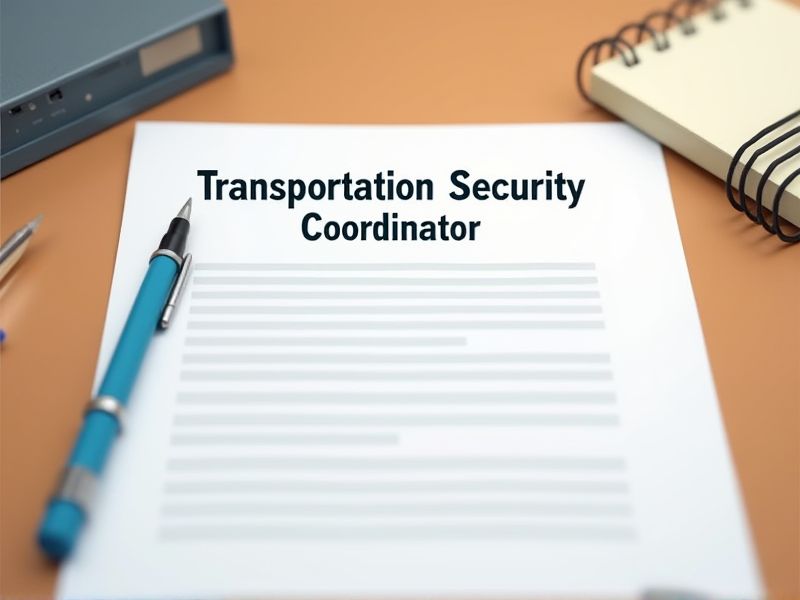
Transportation Security Coordinators ensure the safety and compliance of transportation systems, necessitating a robust understanding of security protocols. Certifications provide standardized knowledge and expertise, crucial for implementing effective security measures. Regulatory bodies often require proofs of competency, making certifications indispensable. Below are key certifications essential for a Transportation Security Coordinator.
Transportation Worker Identification Credential (TWIC)
The TWIC is essential for a Transportation Security Coordinator because it verifies that they have been vetted through a security threat assessment, ensuring trustworthiness and reducing security risks. With a TWIC, coordinators gain unescorted access to secure maritime facilities and vessels, facilitating efficient oversight of security protocols. This credential also harmonizes access requirements across various facilities, streamlining the coordination process. Holding a TWIC signals compliance with federal regulations, reassuring stakeholders of the coordinator's commitment to maintaining maritime security.
Certified Protection Professional (CPP)
The role of a Certified Protection Professional (CPP) enhances a Transportation Security Coordinator's ability to design effective security protocols due to their extensive understanding of risk assessment. CPPs offer advanced insights into threat prevention strategies, which are crucial for maintaining safe and secure transportation systems. Their certification signifies a mastery of security management principles, aiding in the development of comprehensive and adaptable security plans. The CPP credential ensures that the coordinator is updated with industry best practices, essential for managing evolving security challenges in transportation.
Certified Security Professional (CSP)
With cybersecurity threats increasing, a Certified Security Professional (CSP) ensures robust protection against unauthorized access and data breaches in transportation systems. Transportation infrastructures, being critical national assets, require a CSP to implement and maintain security protocols that meet regulatory standards. As transport networks become more digitized, a CSP provides the expertise needed to safeguard sensitive information and maintain operational integrity. The presence of a CSP helps develop a culture of security awareness among employees, reducing human-related security risks.
Certified in Homeland Security (CHS)
The CHS certification provides a comprehensive understanding of national security protocols critical for identifying and mitigating threats in transportation hubs. This credential enhances a Transportation Security Coordinator's ability to implement effective risk management strategies, thereby ensuring public safety. Certified coordinators gain access to ongoing education and updates on emerging security challenges. A standardized certification fosters consistency and reliability in security operations across various transportation networks.
Certified Security Manager (CSM)
A Certified Security Manager possesses specialized knowledge that enhances the effectiveness of a Transportation Security Coordinator, ensuring robust security protocols. The CSM's expertise in regulatory compliance leads to minimized violations, thus maintaining operational continuity in transportation sectors. Their analytical skills help identify potential threats, which increases the overall safety of passengers and staff. Effective crisis management by a CSM reduces the impact of security breaches, thus preserving public trust in transportation services.
Certified Emergency Manager (CEM)
The role of a Transportation Security Coordinator encompasses crisis management, which demands the specialized expertise of a Certified Emergency Manager (CEM) to ensure effective response strategies. The CEM's comprehensive training in risk assessment and emergency preparedness enhances the coordinator's ability to anticipate and mitigate potential threats. Regulatory compliance in transportation security often involves intricate protocols managed efficiently by those with CEM certification. Knowledge of public safety communications, part of the CEM curriculum, is essential for seamless coordination during transportation disruptions.
Certified Information Systems Security Professional (CISSP)
A Transportation Security Coordinator often deals with safeguarding transportation systems, making cybersecurity expertise critical due to the increased reliance on digital infrastructure. Achieving CISSP certification provides a comprehensive understanding of information security, addressing potential vulnerabilities in transportation systems. The certification equips coordinators with the skills to design and implement robust security protocols, essential in preventing cyber threats. Employers value CISSP credentials as they signify a high level of professional competence, enhancing the coordinator's ability to protect sensitive information and infrastructure effectively.
ISO 28000 Lead Implementer Certification
The ISO 28000 Lead Implementer Certification ensures that a Transportation Security Coordinator has the expertise to assess and manage supply chain security risks effectively. This certification enhances the ability to create robust security protocols, reducing vulnerabilities in transportation networks. It signals to stakeholders and partners that the coordinator adheres to international standards for security management practices. Additionally, it helps in the smooth integration of security processes within organizational operations, ensuring compliance with legal and regulatory requirements.
Customs Trade Partnership Against Terrorism (CTPAT) Certification
CTPAT Certification is essential for a Transportation Security Coordinator because it establishes compliance with international security standards, reducing the risk of terrorism. It facilitates faster border processing times and lower inspection rates for certified members, increasing efficiency in the supply chain. The certification enhances trust with partners and stakeholders as it signifies a commitment to secure trade practices. It also encourages continuous improvement in security measures, adapting to evolving threats and maintaining a resilient transportation infrastructure.
Certified Transportation Professional (CTP)
Organizations seeking to enhance their logistics team benefit from Certified Transportation Professionals due to their comprehensive understanding of transportation regulations and practices. Holding a CTP credential can lead to improved risk management, as professionals are equipped with knowledge on securing and optimizing supply chains. Transportation security coordinators with a CTP certification provide assurance of advanced problem-solving capabilities in dealing with complex logistical challenges. A CTP designation often correlates with increased operational efficiency, reducing potential security breaches in transportation networks.
Summary
You will enhance your professional credibility as a Transportation Security Coordinator with relevant certifications. This will likely lead to increased job opportunities and potentially higher salary prospects. Employers often prioritize candidates with certifications for security-sensitive roles, thus increasing your employability. With advanced skills and knowledge, you'll contribute more effectively to organizational security compliance and efficiency.
